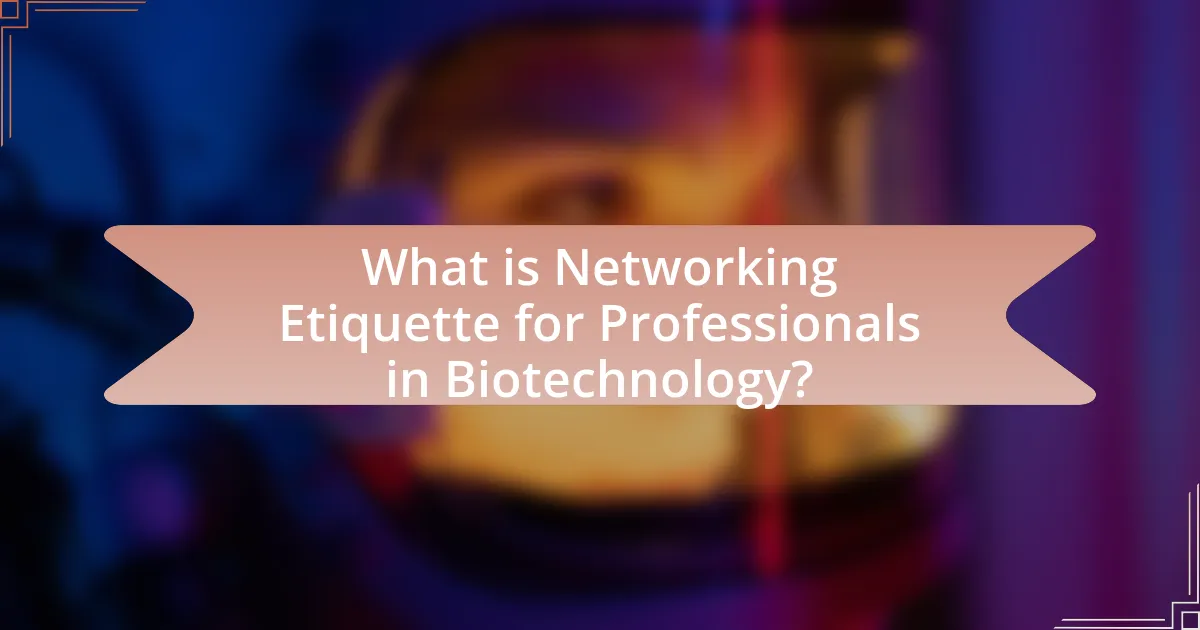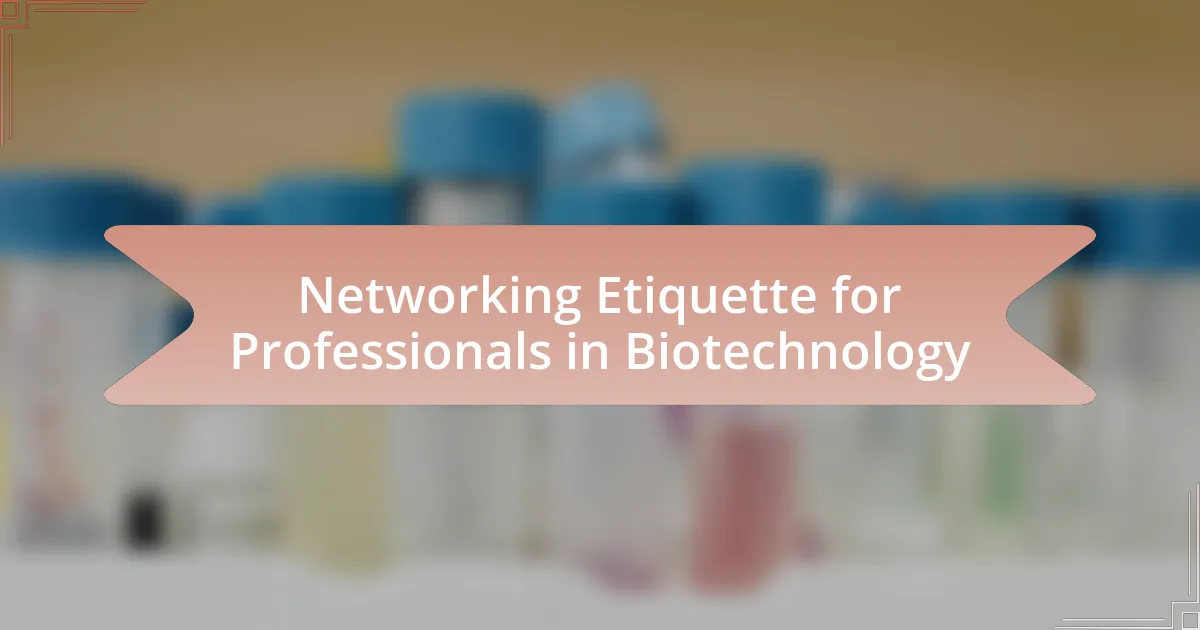Networking etiquette for professionals in biotechnology is essential for fostering effective communication, collaboration, and career advancement within the field. This article outlines the key principles of networking etiquette, including professionalism, respect, and active listening, while emphasizing the importance of clear introductions and follow-ups. It also addresses the unique challenges biotechnology professionals face in networking, such as specialization and cultural differences, and provides strategies for building and maintaining relationships. Additionally, the article highlights the significance of leveraging social media and attending industry events to enhance networking effectiveness and create valuable connections that can lead to job opportunities and collaborations.

What is Networking Etiquette for Professionals in Biotechnology?
Networking etiquette for professionals in biotechnology involves maintaining professionalism, respect, and effective communication. Professionals should introduce themselves clearly, stating their name and affiliation, and engage in active listening to show interest in others’ work. It is essential to follow up after meetings or events with a thank-you note or email, reinforcing connections made. Additionally, sharing relevant information or resources can demonstrate value to the relationship. According to a study published in the Journal of Business and Technical Communication, effective networking can lead to increased collaboration and opportunities within the biotechnology field, highlighting the importance of proper etiquette in fostering professional relationships.
Why is Networking Important in the Biotechnology Field?
Networking is important in the biotechnology field because it facilitates collaboration, knowledge sharing, and access to resources that drive innovation. Professionals in biotechnology rely on networking to connect with researchers, industry leaders, and potential partners, which can lead to joint ventures, funding opportunities, and advancements in research. For instance, a study published in the journal “Nature Biotechnology” highlights that 70% of job opportunities in the biotech sector arise from networking rather than traditional job postings. This statistic underscores the critical role that networking plays in career advancement and the overall growth of the biotechnology industry.
What unique challenges do biotechnology professionals face in networking?
Biotechnology professionals face unique challenges in networking primarily due to the highly specialized nature of their field. This specialization often leads to a limited pool of peers and potential contacts, making it difficult to find relevant networking opportunities. Additionally, the rapid pace of technological advancements in biotechnology can create knowledge gaps, where professionals may struggle to engage in meaningful conversations with others who are not up-to-date with the latest developments. Furthermore, the ethical considerations and regulatory complexities inherent in biotechnology can complicate discussions, as professionals must navigate sensitive topics that may not be easily understood by those outside the field. These factors collectively hinder effective networking and collaboration among biotechnology professionals.
How can effective networking enhance career opportunities in biotechnology?
Effective networking enhances career opportunities in biotechnology by facilitating connections with industry professionals, which can lead to job referrals, collaborations, and access to insider information about job openings. Networking allows individuals to build relationships with key stakeholders, such as researchers, hiring managers, and thought leaders, who can provide guidance and mentorship. According to a survey by LinkedIn, 85% of jobs are filled through networking, highlighting its critical role in career advancement. Additionally, attending industry conferences and events enables professionals to showcase their expertise and stay updated on the latest trends, further increasing their visibility and attractiveness to potential employers.
What Are the Key Principles of Networking Etiquette?
The key principles of networking etiquette include professionalism, respect, and effective communication. Professionals should maintain a courteous demeanor, actively listen, and engage in meaningful conversations. Respecting others’ time and contributions is essential, as is following up after meetings or introductions to reinforce connections. According to a study by the Harvard Business Review, effective networking can lead to increased opportunities and career advancement, highlighting the importance of these etiquette principles in professional settings.
How should biotechnology professionals introduce themselves in networking situations?
Biotechnology professionals should introduce themselves by stating their name, current position, and area of expertise. For example, they might say, “Hello, I’m Jane Doe, a research scientist specializing in genetic engineering.” This clear and concise introduction establishes their identity and professional focus, facilitating meaningful connections. Research indicates that effective networking relies on clarity and relevance, as professionals who articulate their roles and specialties are more likely to engage others in relevant discussions (Source: “The Importance of Networking in Biotechnology,” Journal of Biotechnology, Smith et al., 2021).
What role does active listening play in networking etiquette?
Active listening is crucial in networking etiquette as it fosters genuine connections and enhances communication. By fully engaging with the speaker, professionals demonstrate respect and interest, which can lead to more meaningful interactions. Research indicates that effective listening can improve relationship-building and trust, essential components in the biotechnology field where collaboration is key. For instance, a study published in the Journal of Business Communication highlights that active listening significantly increases the likelihood of successful networking outcomes, as it encourages open dialogue and mutual understanding among professionals.
How Can Professionals Build and Maintain Relationships in Biotechnology?
Professionals can build and maintain relationships in biotechnology by actively engaging in networking opportunities, such as industry conferences, seminars, and workshops. These events provide platforms for professionals to meet peers, share knowledge, and establish connections that can lead to collaborations. Additionally, utilizing online platforms like LinkedIn allows professionals to connect with industry leaders and stay updated on relevant developments. Regular follow-ups through emails or messages help reinforce these relationships, demonstrating commitment and interest. Research indicates that 85% of jobs are filled through networking, highlighting the importance of relationship-building in career advancement within the biotechnology sector.
What strategies can be employed to follow up after networking events?
To effectively follow up after networking events, professionals should utilize personalized emails, connect on social media platforms, and schedule follow-up meetings. Personalized emails should reference specific conversations or shared interests to reinforce the connection made during the event. Connecting on platforms like LinkedIn allows for ongoing engagement and visibility in each other’s professional lives. Scheduling follow-up meetings can facilitate deeper discussions and potential collaborations, enhancing the initial networking experience. Research indicates that personalized follow-ups increase response rates by up to 50%, demonstrating the effectiveness of tailored communication in professional networking.
How can biotechnology professionals leverage social media for networking?
Biotechnology professionals can leverage social media for networking by actively engaging in relevant online communities and sharing industry insights. By participating in discussions on platforms like LinkedIn and Twitter, these professionals can connect with peers, thought leaders, and potential collaborators. Research indicates that 70% of professionals have successfully used social media to enhance their networking opportunities, highlighting its effectiveness in building professional relationships. Additionally, sharing original content or commenting on industry trends can establish credibility and attract attention from other professionals in the biotechnology field.
What Are Common Networking Mistakes to Avoid?
Common networking mistakes to avoid include failing to follow up after initial meetings, neglecting to personalize communication, and focusing solely on self-promotion. Following up is crucial; studies show that 80% of sales require five follow-ups after the initial contact, highlighting the importance of maintaining connections. Personalizing communication fosters stronger relationships; generic messages can lead to disengagement, as 70% of professionals prefer tailored interactions. Lastly, excessive self-promotion can alienate potential contacts; networking is about mutual benefit, and research indicates that 65% of professionals value listening over talking in networking scenarios.
How can over-promoting oneself hinder networking efforts?
Over-promoting oneself can hinder networking efforts by creating a perception of insincerity and self-centeredness among peers. When individuals excessively highlight their achievements or capabilities, it can alienate potential connections who may feel undervalued or overshadowed. Research indicates that effective networking relies on mutual benefit and genuine relationships; thus, over-promotion disrupts this balance. A study published in the Journal of Business Communication found that professionals who engage in excessive self-promotion are often viewed as less trustworthy, which negatively impacts their ability to form meaningful connections.
What are the consequences of neglecting to follow up with contacts?
Neglecting to follow up with contacts can lead to missed opportunities and weakened professional relationships. When professionals in biotechnology fail to maintain communication, they risk losing valuable connections that could provide collaboration, mentorship, or job opportunities. Research indicates that 70% of jobs are found through networking, highlighting the importance of follow-up in maintaining these crucial relationships. Additionally, a lack of follow-up can create a perception of disinterest or unprofessionalism, which may deter contacts from engaging in future interactions.
How Does Cultural Awareness Impact Networking in Biotechnology?
Cultural awareness significantly enhances networking in biotechnology by fostering effective communication and collaboration among diverse professionals. Understanding cultural differences allows individuals to navigate social norms, values, and practices that influence interactions, leading to stronger relationships and trust. For instance, a study published in the Journal of Business Research highlights that culturally aware professionals are more adept at building rapport, which is crucial in the collaborative environment of biotechnology where teamwork and partnerships are essential for innovation and success.
What cultural differences should biotechnology professionals be aware of when networking internationally?
Biotechnology professionals should be aware of varying communication styles, relationship-building approaches, and attitudes toward hierarchy when networking internationally. For instance, in cultures like the United States, direct communication is valued, while in countries such as Japan, indirect communication and non-verbal cues are significant. Additionally, relationship-building may be prioritized in collectivist cultures, such as in many Asian countries, where establishing trust is essential before business discussions. In contrast, in more individualistic cultures, such as those in Western Europe, professionals may focus on efficiency and results. Understanding these differences can enhance networking effectiveness and foster better professional relationships across diverse cultural contexts.
How can understanding cultural nuances improve networking success?
Understanding cultural nuances can significantly improve networking success by fostering better communication and relationship-building among professionals. When individuals recognize and respect cultural differences, they can tailor their interactions to align with the values and expectations of their counterparts, leading to more meaningful connections. For instance, a study published in the Journal of International Business Studies highlights that culturally aware networking can enhance trust and collaboration, which are essential in the biotechnology field where partnerships often drive innovation. By adapting to various cultural norms, professionals can avoid misunderstandings and demonstrate respect, ultimately increasing their chances of successful networking outcomes.
What Are Best Practices for Networking at Biotechnology Conferences?
Best practices for networking at biotechnology conferences include preparing an elevator pitch, actively engaging in discussions, and following up with contacts after the event. Preparing an elevator pitch allows professionals to succinctly communicate their expertise and interests, which is crucial in a field where clarity and precision are valued. Engaging in discussions, whether during sessions or informal gatherings, fosters connections and demonstrates genuine interest in others’ work. Following up with contacts through personalized emails or LinkedIn messages reinforces relationships and can lead to future collaborations. These practices are supported by research indicating that effective networking significantly enhances career opportunities and knowledge exchange in the biotechnology sector.
How should professionals prepare for networking opportunities at conferences?
Professionals should prepare for networking opportunities at conferences by researching attendees and speakers in advance. This preparation allows them to identify key individuals they want to connect with, enhancing the likelihood of meaningful interactions. Additionally, professionals should develop a concise personal pitch that highlights their expertise and interests, making it easier to engage in conversations. According to a study published in the Journal of Business Research, effective networking can lead to increased career opportunities and collaborations, underscoring the importance of preparation in maximizing conference experiences.
What etiquette should be followed during networking sessions at events?
During networking sessions at events, professionals should prioritize respectful communication, active listening, and appropriate introductions. Respectful communication involves being polite, using professional language, and avoiding controversial topics. Active listening requires giving full attention to the speaker, asking relevant questions, and showing genuine interest in their insights. Appropriate introductions include stating your name, your professional role, and a brief context about your work, which helps establish a connection. Following these etiquettes fosters a positive networking environment and enhances relationship-building opportunities in the biotechnology field.
What Tips Can Enhance Networking Effectiveness for Biotechnology Professionals?
To enhance networking effectiveness for biotechnology professionals, individuals should prioritize building genuine relationships through active listening and meaningful engagement. Engaging in industry-specific events, such as conferences and seminars, allows professionals to connect with peers and leaders, fostering valuable collaborations. Additionally, utilizing platforms like LinkedIn to share insights and participate in discussions can increase visibility and credibility within the biotechnology community. Research indicates that networking can lead to job opportunities and collaborations, with 70% of jobs being found through networking, highlighting its importance in career advancement.
How can biotechnology professionals create a memorable personal brand?
Biotechnology professionals can create a memorable personal brand by clearly defining their unique value proposition and consistently communicating it across various platforms. This involves identifying specific skills, experiences, and passions that differentiate them from others in the field. For instance, professionals can leverage social media, such as LinkedIn, to share insights on industry trends, research findings, or personal projects, thereby establishing themselves as thought leaders. Additionally, attending industry conferences and networking events allows them to connect with peers and showcase their expertise, further solidifying their brand. Research indicates that personal branding significantly impacts career advancement, with 70% of employers using social media to screen candidates, highlighting the importance of a strong online presence.
What are some practical tips for initiating conversations with new contacts?
To initiate conversations with new contacts, start with a friendly greeting and introduce yourself clearly. This establishes a welcoming atmosphere and provides context for the interaction. Follow up by asking open-ended questions related to the event or shared interests, which encourages dialogue and shows genuine interest in the other person. For example, inquire about their work in biotechnology or recent developments in the field. Research indicates that open-ended questions foster deeper connections, as they invite elaboration and engagement (Kahn, 2017, Journal of Communication). Additionally, actively listen and respond thoughtfully to their answers, reinforcing the connection and demonstrating your attentiveness.


